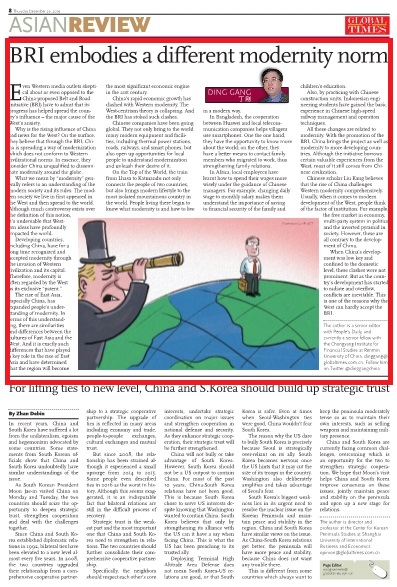Belt and Road
Your Present Location: PROGRAMS> Belt and RoadDing Gang: BRI embodies a different modernity norm
By Ding Gang Source:Global Times Published: 2019-12-25

Even Western media outlets skeptical about or even opposed to the China-proposed Belt and Road Initiative (BRI) have to admit that its progress has helped spread the country's influence - the major cause of the West's anxiety.
Why is the rising influence of China bad news for the West? On the surface, they believe that through the BRI, China is spreading a way of modernization which does not conform to Western civilizational norms. In essence, they consider China unqualified to disseminate modernity around the globe.
What we mean by "modernity" generally refers to an understanding of the modern society and its rules. The modern society we live in first appeared in the West and then spread to the world. Although much controversy exists over the definition of this notion, it's undeniable that Western ideas have profoundly impacted the world.
Developing countries, including China, have for a long time recognized and accepted modernity through the invasion of Western civilization and its capital. Therefore, modernity is often regarded by the West as its exclusive "patent."
The rise of East Asia, especially China, has expanded people's understanding of modernity. In terms of this understanding, there are similarities and differences between the cultures of East Asia and the West. And it is exactly such differences that have played a key role in the rise of East Asia and have determined that the region will become the most significant economic engine in the 21st century.
China's rapid economic growth has clashed with Western modernity. The West-centrism theory is collapsing. And the BRI has stoked such clashes.
Chinese companies have been going global. They not only bring to the world many modern equipment and facilities, including thermal power stations, roads, railways, and smart phones, but also open up opportunities for local people to understand modernization and unleash their desire of it.
On the Top of the World, the train from Lhasa to Katmandu not only connects the people of two countries, but also brings modern lifestyle to the most isolated mountainous country in the world. People living there begin to know what modernity is and how to live in a modern way.
In Bangladesh, the cooperation between Huawei and local telecommunication companies helps villagers use smartphones. One the one hand, they have the opportunity to know more about the world; on the other, they have a better means to contact family members who migrated to work, thus strengthening family relations.
In Africa, local employees have learnt how to spend their wages more wisely under the guidance of Chinese managers. For example, changing daily wage to monthly salary makes them understand the importance of saving to financial security of the family and children's education.
Also, by practicing with Chinese construction units, Indonesian engineering students have gained the basic experience in Chinese high-speed railway management and operation techniques.
All these changes are related to modernity. With the promotion of the BRI, China brings the project as well as modernity to more developing countries. Although the initiative borrows certain valuable experiences from the West, most of it still comes from Chinese civilization.
Chinese scholar Liu Kang believes that the rise of China challenges Western modernity comprehensively. Usually, when it comes to modern development of the West, people think of the factor of institution. For example, the free market in economy, multi-party system in politics and the inverted pyramid in society. However, these are all contrary to the development of China.
When China's development was low key and confined to the domestic level, these clashes were not prominent. But as the country's development has started to radiate and overflow, conflicts are inevitable. This is one of the reasons why the West can hardly accept the BRI.
The author is a senior editor with People's Daily, and currently a senior fellow with the Chongyang Institute for Financial Studies at Renmin University of China.























































































 京公网安备 11010802037854号
京公网安备 11010802037854号





